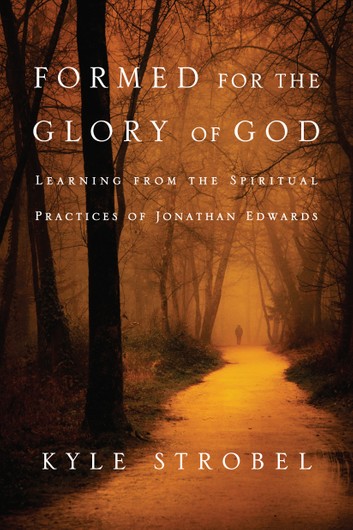Of the writing of books about Jonathan Edwards there is no end. Nearly every month, it seems, at least one new volume appears. Some of these are technical monographs written by scholars, while others are popular devotional books or biographies written by pastors. And this isn’t even counting the dozens of journal articles, book chapters, and dissertations.
One of the most helpful works I’ve read about Edwards in recent months is Kyle Strobel’s Formed for the Glory of God: Learning from the Spiritual Practices of Jonathan Edwards. Strobel is a theologian with expertise in both Edwards’s theology and also Christian spirituality. These two emphases are brought together in this delightful book, which is a handbook for spiritual growth that uses Edwards as the central dialogue partner. Formed for the Glory of God isn’t a dry academic study of spirituality; instead, Strobel argues that “Christian spirituality is ultimately about the work of the Spirit to bind us to the Son in love” (13). Strobel believes Edwards is a great role model for healthy, evangelical spirituality. He writes, “In Edwards’s grasp of spiritual formation we find a well-rounded account of following Christ, an account that deserves to be meditated upon in our day as much as in his own” (15).
True North
Strobel divides his book into two parts with seven chapters and four appendices. Chapter one shows how Edwards’s spirituality portrays the Christian life as a journey toward the beatific vision of God that will occur when we are glorified in the next life. Upon conversion, Christians are given new spiritual sight that guides us in this pilgrimage and begins to fit us for heaven, where we will forever be in the presence of our Creator and Redeemer. The second chapter roots Edwards’s spirituality in his evangelical view of salvation as a personal, covenantal relationship with the triune God. When we believe, God forgives us of our sins, adopts us into his family, and empowers us through his Spirit. The third chapter discusses Edwards’s view of the affections—a central theme in Edwardsian thought. Through faith, God communicates himself to us, renewing our hearts and redirecting our intellect, emotions, and will in a Godward direction. Put another way, our internal compass, previously distorted by sin, is now recalibrated to the “true north” of God’s glory in Christ.

Formed for the Glory of God: Learning from the Spiritual Practices of Jonathan Edwards
Kyle Strobel
Formed for the Glory of God: Learning from the Spiritual Practices of Jonathan Edwards
Kyle Strobel
In part two, Strobel looks at Edwards’s understanding of the spiritual disciplines as a means of grace. The Word of God and prayer are spiritual disciples (or “postures,” as Strobel prefers) that orient our hearts toward God and his gospel. God works through these disciplines to draw us closer to him and grow us in holiness. Strobel also examines the relationship between the knowledge of God and the knowledge of self, a traditional Reformed theme dating back to John Calvin. Honest self-awareness and self-examination lead us out of the deception of false humility and into the grace of true, spiritual humility. Moreover, Strobel highlights Edwards’s commitment to the Puritan practices of Scripture-saturated, prayerful meditation, which in turn leads to greater contemplation of God and his ways. These emphases are where the head, the heart, devotion, and spiritual happiness intersect for God’s glory.
A handful of other spiritual practices central to Edwards’s spirituality are explored in Formed for the Glory of God. Examples include observing the Sabbath (for Edwards, the Lord’s Day), fasting (personal and especially corporate), a focused form of spiritual accountability called “conferencing,” an approach to self-examining prayer called “soliloquy,” silence and solitude, and personal times of prayer. Strobel includes helpful descriptions of these disciplines and suggestions for how contemporary believers might imitate them. The appendices provide further suggestions along these lines and introduce readers to Strobel’s ongoing Jonathan Edwards Project, a series of books at varying levels of scholarship meant to complement one another.
More for the Church than Scholars
Let me cut to the chase: I really like Formed for the Glory of God, and see four particular strengths to the book. First, while it is certainly well-researched, it is not a scholarly book. Strobel is writing for the church more than for Edwards scholars.
Second, Strobel’s exposition of spiritual formation and spiritual disciplines avoids the incipient legalism that too often accompanies books of this kind. Strobel’s basically Reformed assumptions keep the means of grace rooted in God’s initiative in every step of the Christian journey, from regeneration to glorification.
Third, Strobel demonstrates how Edwards should function a role model for evangelicals who care about practices such as fasting, meditation, and silence, but want to avoid the more mystical (in the bad sense) approaches to these disciplines.
Finally, Strobel shows how Edwards’s spirituality arose from and is reinforced by his theological convictions; for Edwards—and for us—Scripture guides experience, which then confirms Scripture. My only mild complaint about the book is its lack of an index, which would have made it even more accessible.
Formed for the Glory of God is an informative and practical introduction to Edwards’s spirituality. It is also a useful primer to Christian spirituality in general—particularly for readers who consider themselves evangelical and/or Reformed in their convictions. The book is an excellent resource for church staffs, seminary or college courses, and even personal devotional reading. Readers interested in the writings of authors such as Dallas Willard, Richard Foster, and Donald Whitney will especially enjoy learning from the spiritual practices of the most influential pastor-theologian in American history. I will be recommending it to my students.

































